
by Yolanda Goode | Sep 27, 2019

Plan to attend the 2019 UF IFAS Art, Garden and Farm Family Festival
Fall is coming soon and an amazing family friendly event is coming soon after that. Don’t miss the 2019 Art, Garden, and Farm Family Festival on Saturday, October 5, 2019! The 2019 Art, Garden, and Farm Family Festival is an event that attracts a diverse audience from the Big Bend area. This annual event brings fall colors, festive activities, and local vendors that you will enjoy visiting with.
Enjoy your Saturday with us by taking a tour of the UF/IFAS North Florida Research and Education Center’s beautiful gardens while at the festival! And once inspired from your nature walk, ask our EXPERTS at the UF/IFAS horticulture booth so you too, can have a gorgeous garden of your own! After getting your questions answered, journey down to the annual plant sale while enjoying the local musical entertainment, homemade jams, jellies, honey, baked goods, and craft vendors along the way. It’s a magical Fall Saturday filled with festivities!
EVENT DETAILS
- What: 2019 Art, Garden and Farm Family Festival
- When: October 5, 2019, from 9:00 AM until 2:00 PM (Eastern Standard Time)
- Where: North Florida Research Center, Quincy FL on Pat Thomas Highway
- Who: Open to the Public
- Why: Visit the informational booths, craft vendors, kid’s zone, food vendors, and plant sale. Enjoy live entertainment.
- Cost: Free
- For More Information: https://nfrec.ifas.ufl.edu/art-and-garden/
This year, the 4-H Educational Booth will be in the Kid’s Zone. Bring the kids over to learn more about wildlife, 4-H, and assemble a bumble bee! You may even buzzzzz across some friends that you have not seen in a while! Remember to bring money so you can support the local 4-H club’s fundraising efforts. Save the date so we can see you on October 5, 2019!
Looking for additional community events, family activities, educational opportunities? Visit your local UF IFAS County Extension Office and meet your 4-H Extension Agent for additional 4-H information and events that can benefit you and your family.
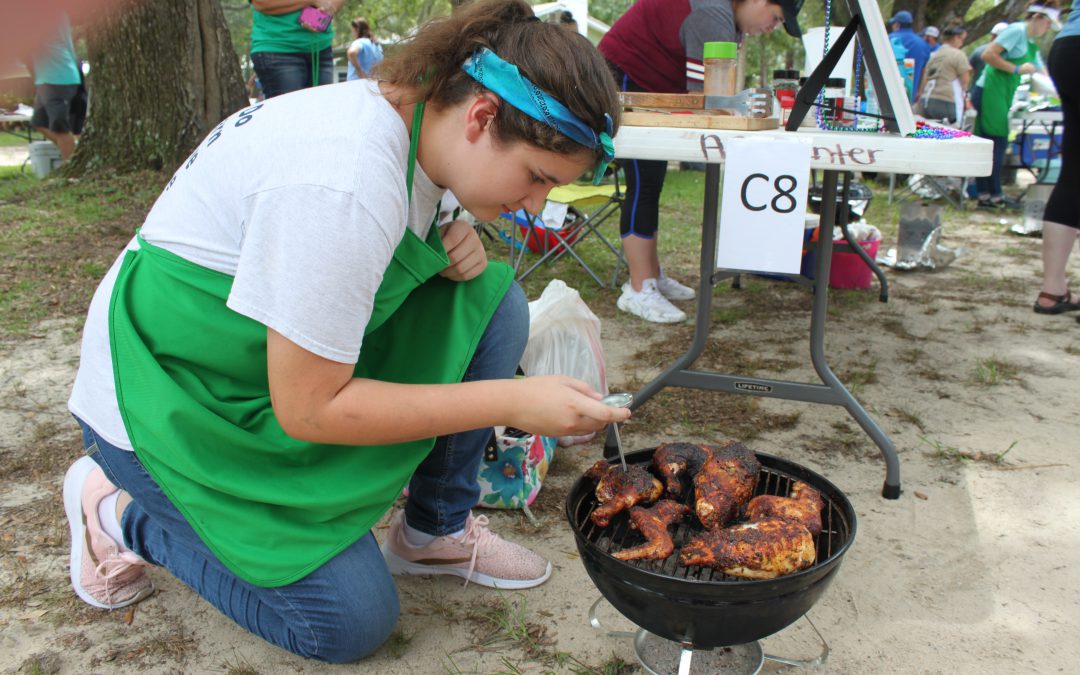
by bestevez | Sep 20, 2019
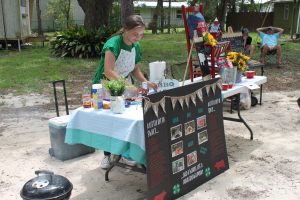
A youth competing in the NW District Tailgating Competition carefully prepares her protein.
Did you get to do any grilling this summer? Over 110 youth from throughout the Florida Panhandle participated in 2019 4-H summer day camps that taught them how to grill, food and fire safety, and cooking skills.
Ten different FL Panhandle counties provided nine unique day camps on grilling. Then, on July 20, 2019, 37 youth from eight counties participated in the Northwest District Tailgating Contest at the Washington County Ag Center. Youth participated in competitions in beef, pork, poultry, and shrimp divisions and were judged on their food and fire safety skills around the grill and the taste of their chosen protein. In all, $3,200 was awarded to Panhandle youth for placing 1st– 4th in their competitions.
Now, the top two youth in each protein category will compete at the Florida 4-H Tailgating Contest in Gainesville on September 28th. They will compete against youth from across Florida for an opportunity to win college scholarships. For the state contest, the first place winner in each protein area receives a $1,500 college scholarship and the second place winner receives a $1,000 college scholarship. September 28th is also the 4-H Day with the Florida Gators. You can get tickets for the football game for just $20 and sit with 4-H members from around the state. For more information, visit http://florida4h.org/blog/4-h-day-at-florida-gators-football-vs-towson/.
Join us as we cheer on the following NW District 4-H participants as they represent us at the Florida 4-H State Tailgating Contest:
- Beef Division
- Colton Serpas-Washington County
- Alan B.-Escambia County
- Pork Division
- Lillian Sparks-Washington County
- Brent Young-Holmes County
- Poultry Division
- Sarah Crandall-Jefferson County
- Rylee Sweat-Walton County
- Jamison Scheffer-Washington County
- Shrimp Division
- Claire Diamond-Escambia County
- Evelyn Moyers-Bay County
If you are interested in furthering your grilling skills, please check out the Florida 4-H Tailgate Series of EDIS documents at https://edis.ifas.ufl.edu/topic_series_florida_4-h_tailgate. If you would like more information on the Tailgating Contest so you or youth that you work with can participate next year, please visit http://florida4h.org/programsandevents_/animalscience/4-h-tailgating-contest/.
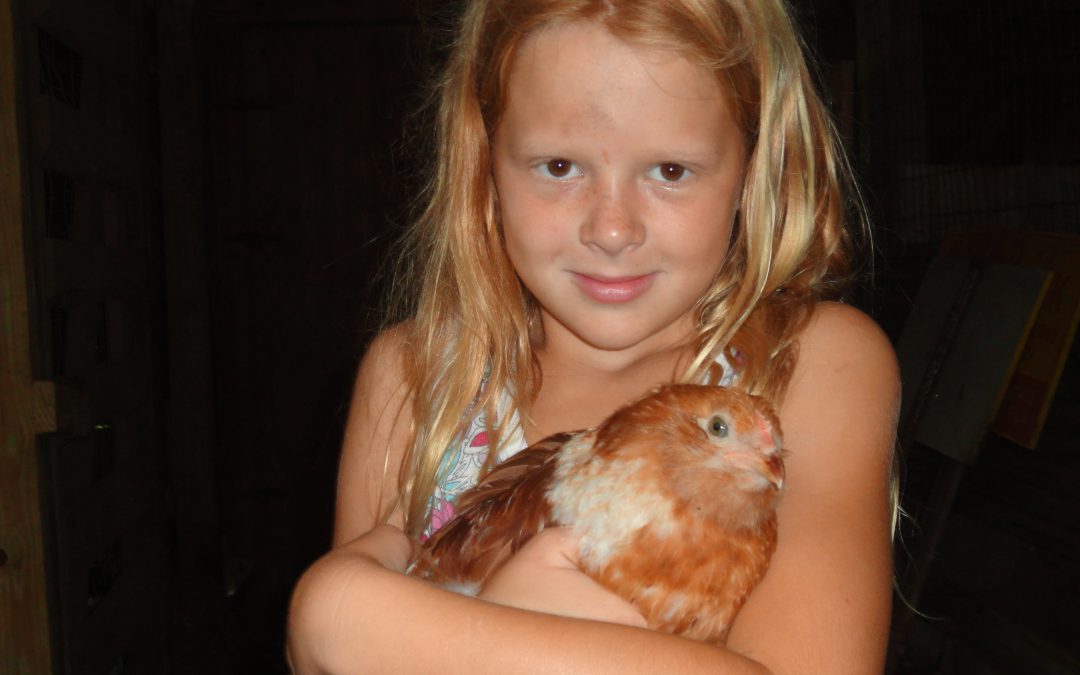
by Julie Pigott Dillard | Sep 13, 2019
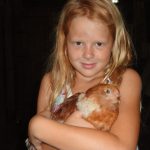
Learning responsibility is just one of the many skills learned through 4-H Chick Chain.
Since March, 4-Hers have watched their chicks grow day by day into pullets. Spanning six months, the 4-H Chick Chain project teaches youth how to care for growing chickens. They’ve learned all about nutrition, housing needs, and disease management along with showmanship preparation and practices. Youth kept project books of their experiences, taking note of expenses, and breed information. Youth who participated in the past 2018 project have continued to care for their chickens who are now laying eggs and providing a food source for their family.
On September 28th, youth will participate in the 2019 4-H Chick Chain Show. For 2019 projects, youth will exhibit two of their best project pullets (a pullet is less than one year old at laying age), participate in showmanship to show off their handling skills, and enjoy a skill-a-thon to show what information and knowledge they’ve learned during the year. For 2018 projects, those youth will bring their two best layers which are now in peak egg production.

Best of Breed winners from the 2018 4-H Chick Chain
2019 4-H Chick Chain Show Details
For youth participating in the 2019 4-H Chick Chain Show, remember to register through your 4HOnline profile by midnight, September 13th. Your project book and photography entries are also due to your 4-H agent that day.
Youth will earn awards in skill-a-thon and showmanship. Awards will be given to best of breed and overall champions will be named.
Here’s a timeline of events for the 2019 4-H Chick Show:
Saturday, September 28, 2019
Washington County Ag Center – 1424 Jackson Ave, Chipley, FL – check-in on the west end of the building.
- If your flock is NPIP certified, bring your card to check-in
- 8-8:30 am – District II Check-in (Walton, Washington)
- 9-9:30 am – District III Check-in (Leon, Liberty, Jefferson, Wakulla, Franklin, Gadsden)
- 10-10:30 am – District I Check-in (Escambia, Okaloosa, Santa Rosa)
As soon as birds are checked-in, youth will participate in showmanship and skill-a-thon with awards tentatively scheduled for 12 pm.
Resources:
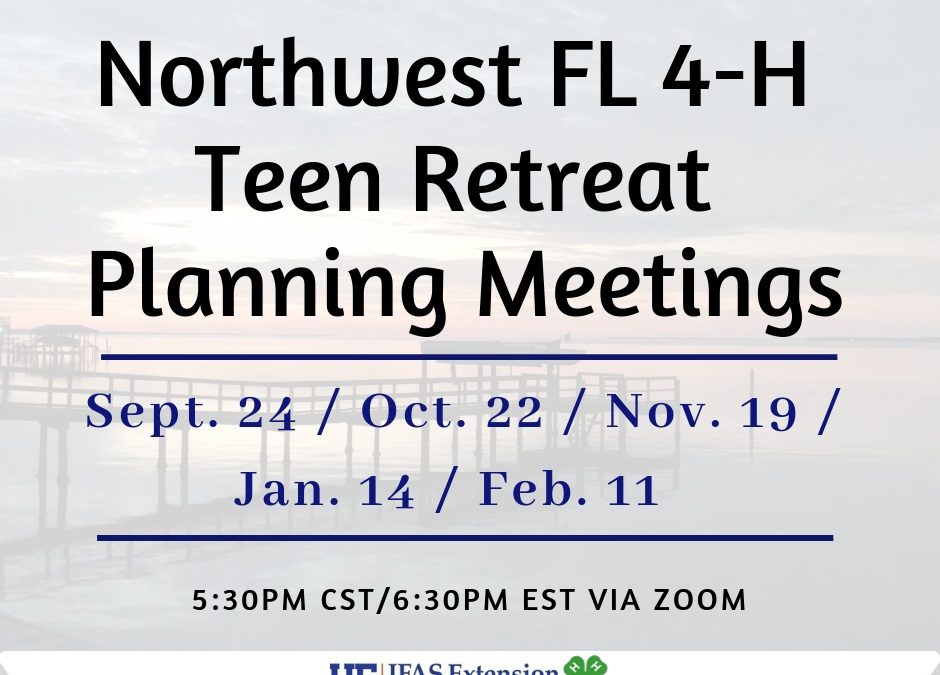
by Whitney Cherry | Sep 6, 2019
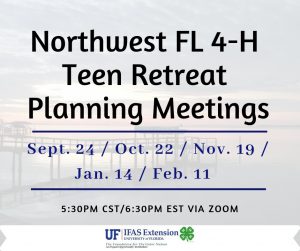 The start of the new 4-H year means it’s time to start gearing up for the 2020 NW District Teen Retreat! All teens ages 13-18 as of September 1, 2019 are invited to be on the Planning Committee. Teen Retreat is a high-energy weekend of learning, skill building, and networking with teens from across the 16 counties that make up the Northwest 4-H District of Florida. Planning Committee members set the agenda, choose the theme, activities, and workshop topics, and serve in leadership and teaching roles of their choice during the retreat.
The start of the new 4-H year means it’s time to start gearing up for the 2020 NW District Teen Retreat! All teens ages 13-18 as of September 1, 2019 are invited to be on the Planning Committee. Teen Retreat is a high-energy weekend of learning, skill building, and networking with teens from across the 16 counties that make up the Northwest 4-H District of Florida. Planning Committee members set the agenda, choose the theme, activities, and workshop topics, and serve in leadership and teaching roles of their choice during the retreat.
Committee meetings are held via video conference and can be joined online or by phone at home, on the road, or from your local Extension/4-H Office. To sign up for this committee, please contact your County 4-H Agent for the call-in information. Our goal is to make Teen Retreat 2020 the best one yet, and we can’t do it without you!
DATES TO KNOW:
- Teen Retreat 2020: February 21-23, 2020 at 4-H Camp Timpoochee, Niceville, FL
- Planning Committee Meetings: (for agents and teens)
- Tuesday, September 24, 2020 via Zoom @ 5:30 CT/6:30 ET
- Tuesday, October 22, 2020 via Zoom @ 5:30 PM CT/6:30 ET
- Tuesday, November 19, 2020 via Zoom @ 5:30 PM CT/6:30 ET
- Tuesday, January 14, 2020 via Zoom @ 5:30 PM CT/6:30 ET
- Tuesday, February 11, 2020 via Zoom @ 5:30 PM CT/6:30 ET
RESOURCES:
Get the Zoom app here
Questions? Contact your 4-H Agent & get involved with 4-H!
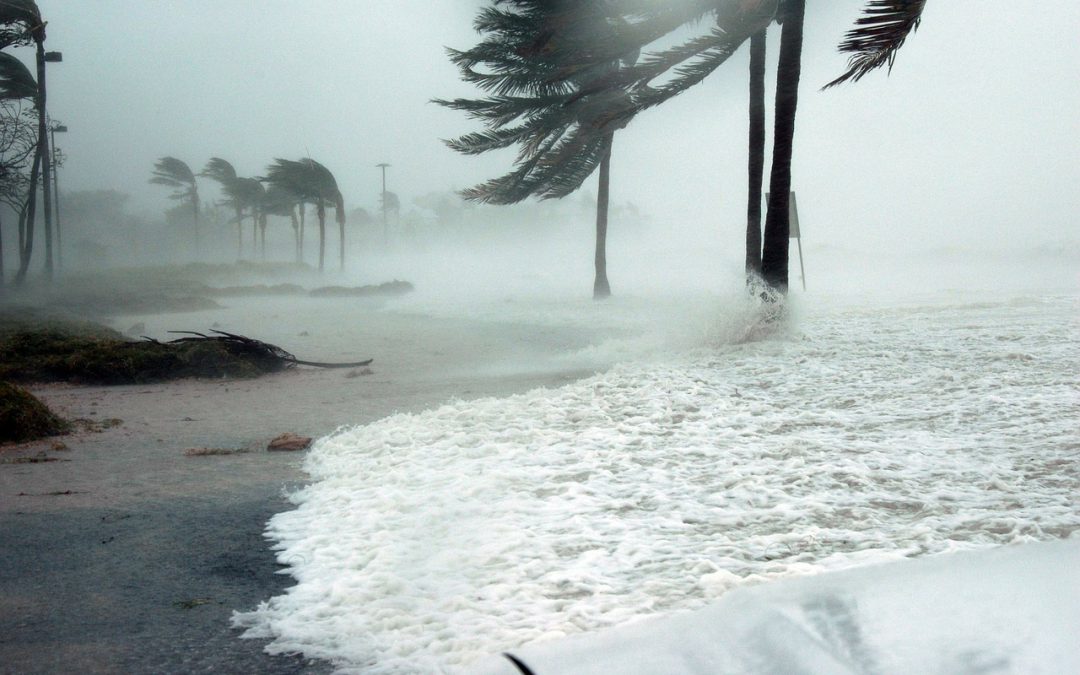
by Niki Crawson | Aug 30, 2019
 With the first real major storm of the 2019 hurricane season pressing down upon the entire state of Florida and the recent state of emergency declared on all 67 Florida counties by Governor DeSantis, it stands to reason that a lot of anxiety is spinning in the atmosphere along with Hurricane Dorian.
With the first real major storm of the 2019 hurricane season pressing down upon the entire state of Florida and the recent state of emergency declared on all 67 Florida counties by Governor DeSantis, it stands to reason that a lot of anxiety is spinning in the atmosphere along with Hurricane Dorian.
Many of us have experienced firsthand how a hurricane can disrupt our lives beyond something we could ever imagine. Some are still living in the disruption, trying desperately to find normalcy again. So, with the threat of Hurricane Dorian looming just a few days away, it is only natural for overwhelming feelings of anxiety, nervousness, and fear to kick in. You may begin to see these feelings develop among your family members, especially your children. It is important to recognize these emotions immediately and take action to help not only yourself but your children as well.
PREPARATION
Preparation is one of the most important ways you can regain control in your situation. In this case, preparation before Hurricane Dorian (or any future storms) will help reduce anxiety, eliminate any confusion among family members, and create clear communication for all. Here are some helpful tips for your family on how you can be prepared and reduce anxiety in the hurricane season:
- Have a family plan – Make it clear, keep it current, and know it well.
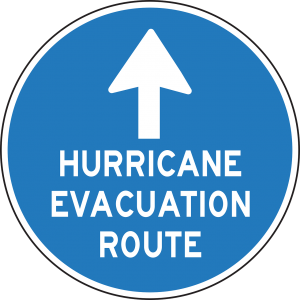
- Talk openly and honestly with your children about the weather situation – Make it a fun science experiment to explain hurricane patterns. Help them to understand how to track the path of the storm. Show them where to get accurate weather information like NOAA’s website.
- Give everyone a role and responsibility – Keep every person involved in the tasks and let them have ownership in getting the family prepared.
- Create your hurricane preparedness kits – Be sure to check out our information on building a disaster preparedness bucket here. Remember to include your pet’s needs.
- Share – Allow children to share feelings, concerns, stories of past experiences. Validate real concerns and allow children to come up with possible solutions or positive actions to alleviate those concerns.
We know that natural disasters can change our lives with little to no notice. Fortunately, Hurricane Dorian is giving you a little extra time to prepare if you have not already done so. Be proactive – take action now and reduce the anxiety level in your household as Dorian approaches. For the latest resources to help prepare and then deal with natural disasters such as Hurricane Dorian, the UF/IFAS Disaster Preparation & Recovery website offers some important information such as updated contacts, useful tips, and videos for you and your family.
We wish you and your loved ones safety this hurricane season. Be smart, be prepared, and be confident that you are prepared this season and beyond.
Visit your local UF IFAS County Extension Office and meet your 4-H Extension Agent for additional information on a variety of topics that can benefit you and your family. From 4-H educational activities to ways to keep your family safe, Extension and 4-H is always available to assist you and your family.
HELPFUL RESOURCES DURING A DISASTER
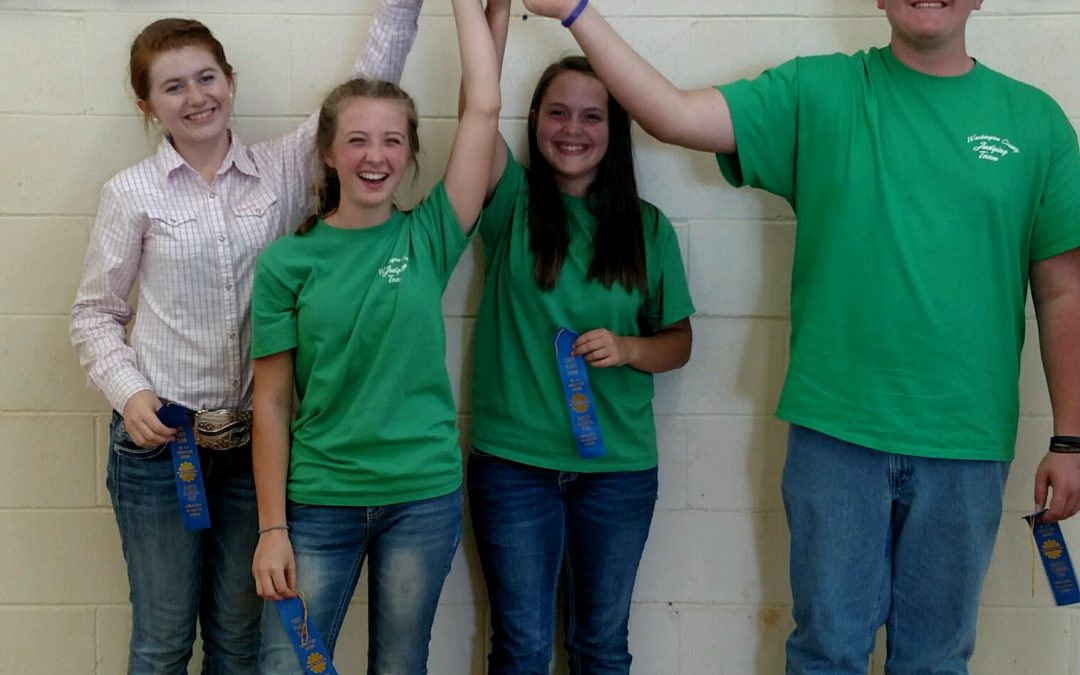
by Julie Pigott Dillard | Aug 23, 2019

Get involved as a 4-H officer!
August is an exciting time of year. Shopping for school supplies, meeting new teachers, seeing old friends, making new ones AND getting ready for the 2019-2020 4-H Year. Your 4-H agents and club leaders are ready to kick off the year with new clubs, returning clubs, and opportunities to make this a fun and educational year.
Here are some things to do now for the new 4-H Year:

Show what you’ve learned through 4-H competitive events.
Upcoming NW 4-H District dates:
Questions? Contact your 4-H Agent & get involved with 4-H!
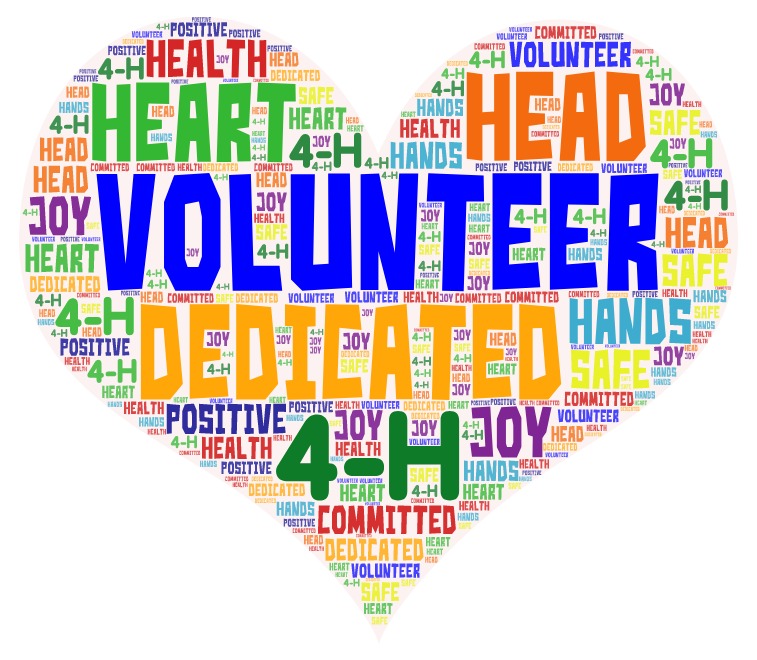
by Niki Crawson | Aug 16, 2019
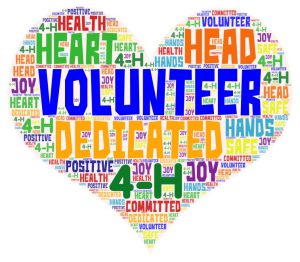
The goal of 4-H is to teach youth essential life skills. In so doing, we find that we also equip them with marketable skills, a sense of belonging, and a sense of self-worth, each of which makes them more apt to be successful. However, besides the most obvious benefit that your volunteer services are to your local youth and community, there are benefits for you personally as well. In fact, studies indicate that individuals who volunteer experience greater health benefits such as an increase in social skills, an expanded social calendar and even a decline in depression.
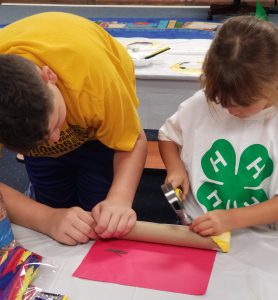
A teen volunteer helps a Cloverbud member during a summer workshop
Another thing to consider is that by volunteering with 4-H you will have the opportunity to make a positive difference in the lives of children. This more than likely will trigger a sense of commitment, pride, and accomplishment in you which leads to a more positive self-image. The more positive your self-image, the more likely you are to set and accomplish positive personal goals, thus feeling a sense of accomplishment which creates a continuous circle of self-worth and confidence.
One of the most undervalued benefits of volunteering with 4-H is the time spent practicing the very life skills you are teaching through 4-H programming like communication, teamwork, and program planning. As you work with your youth to help them develop these life skills, you too are strengthening them in yourself. When they combine their increased life skills with taking part in the wide variety of training opportunities presented through 4-H, some volunteers may open new doors for employment based on the skills they have learned and developed.
In today’s time when families are busier than ever and time seems limited, having a positive adult role model can truly influence the path of youth. Volunteering with a 4-H program allows these positive impacts to occur. If you are already a 4-H volunteer, take pride in your contributions and reap the joy and benefits associated with such. If you are not currently a volunteer, the great news is that you do not have to look far to find a perfect match for your volunteer services…the Florida 4-H program welcomes you, and area 4-H Agents are eager to help you get started!
Now is the perfect time to start your path to volunteering and making a difference! The new 4-H year begins September 1, 2019 and all counties across the state of Florida are in need of positive adults to serve in the role of volunteer. Whether you are interested in working directly with youth to lead a 4-H club or would like to assist behind the scenes in preparing others to facilitate outstanding 4-H programming, Florida 4-H needs dedicated individuals to carry out its mission.
So, go ahead. Reap the benefits of volunteering! Join the 4-H family today. The process to become a volunteer is relatively simple: visit http://florida4h.org to apply online or stop in to your local UF IFAS County Extension Office and meet with your 4-H Extension Agent for assistance.

by pmdavis | Aug 9, 2019
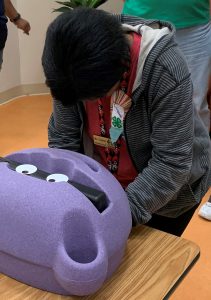
Looking for spots missed during hand washing by using black light and glow germ lotion that fluoresces under black light.
It’s hard to believe it is August already, with that we are getting ready to go back to school. Going back into the large group gathering requires a reminder to wash your hands often. You and your child will be around so many people and exposed to all kinds of germs. Regular hand washing helps you avoid getting sick and spreading your germs to others.
The CDC recommends that we wash our hands:
• Before, during, and after preparing food
• Before eating food
• Before and after caring for someone who is sick
• Before and after treating a cut or wound
• After using the toilet or after changing diapers or cleaning up a child who has used the toilet or been ill
• After blowing your nose, coughing, or sneezing,
• After touching an animal, animal/pet feed or treats, or animal waste
• After touching garbage
Take a moment to sit down and talk with your child about hand washing and the importance of washing their hands, especially when they get home from school.
Try this activity written by Tennessee 4-H to help youth see where they may be missing germs. This simple activity uses items you probably have in your kitchen. Begin by coating hands with a tablespoon of cooking oil. Next, sprinkle the oily hands with ground cinnamon. Have your child wash their hands using the steps outlined below. Once they have finished washing, have them smell their hands to see if they can still smell cinnamon. If they washed their hands correctly, the cinnamon smell and brown color should be gone from their hands.

A. Hands coated with cinnamon before hand washing
B. Quick wash like youth often do missing in between fingers, top of wrist, around nails
C. Thoroughly washed hands (all clean even between fingers)
Here are the steps we teach youth when they take our 4-H hand washing classes:
1. Wet your hands with clean, running water.
2. Apply soap and rub your hands together to make a lather. Make sure to get in between your fingers, under your nails, and on the top of your hands. Youth often miss these areas when we do a lesson on hand washing during 4-H events.
3. Scrub for at least 20 seconds—about the same amount of time needed to sing the Happy Birthday or ABC Song twice.
4. Finish by rinsing your hands with warm running water.
5. Dry hands with a clean towel or let air dry if a towel is not available.
6. Use the towel to turn off the water faucet to prevent re-contamination of your clean hands on a dirty faucet knob.
Have a fun and germ free day! 4-H is a family affair, offering many opportunities where both children and parents can participate in common interests. 4-H is one of the nation’s most diverse organizations and includes people from all economic, racial, social, political, and geographic categories. There are no barriers to participation by any young person. Participants are given the opportunity to engage in activities that hold their personal interest, while being guided by adult volunteers.
To find out more information about other 4-H programs like this or volunteer your time to work with youth, please contact your local UF IFAS County Extension Office.
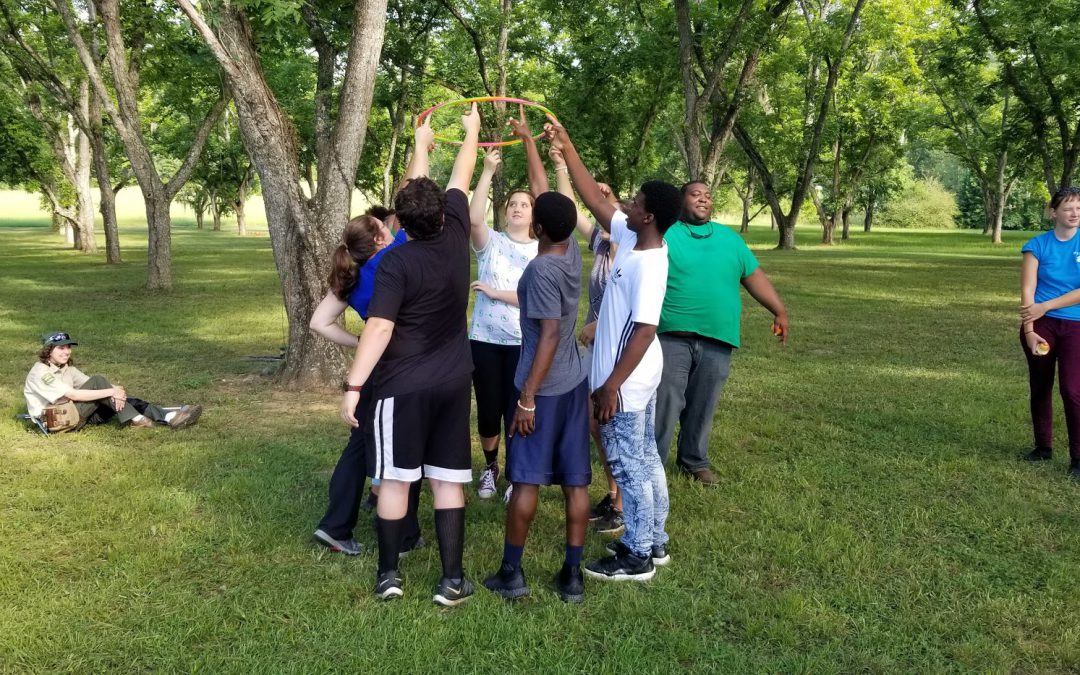
by Marcus Boston Jr. | Aug 2, 2019
Summertime is typically associated with summer vacations, sleeping late, fast foods, rainy days, hot afternoons, and one 4-H camp after the other. Some would argue that summer camps are simply an advanced “day care” program for parents to drop their kids off to “play” so they can be productive at work without worrying about their children. However, research shows that youth who attend camps during the summer come away with so much more than what camping programs are given credit for.
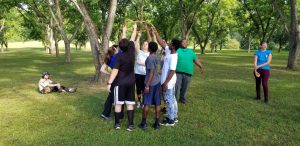
Camp Counselors at Wildlife Camp doing a team building activity.
For many youth, traditional summer camp means no homework, no tests, lots of recreation, camp songs, crafts, and lots of swimming. While these are typical camp activities that normally take place during a week of camp, these experiences have a two-fold purpose in that they also serve as a vehicle for significant learning to take place. Many parents are concerned about the amount of knowledge that kids lose during the summer. There has been substantial research that shows students can lose up to 3 months of what has been learned during the school year. By keeping young people’s brains active, acquiring new skills and knowledge, camp offers the chance to decrease the typical summer learning deficit. How is this done??……I’m glad you asked!
4-H is intentional in providing critical components of a successful learning experience as part of all its summer camp curriculum. These Essential Elements are: Belonging, Independence, Mastery, and Generosity. They are designed to meet the developmental needs of youth. Let me give you some examples.
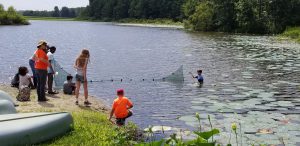
4-H campers seining in Lake Lafayette for aquatic specimens
4-H Camp attendees experience a sense of Belonging, the first Essential Element, during cooling off time at 4-H Camp Cherry Lake, while being cared for by camp staff, counselors, and 4-H Youth Development Professionals. Campers enjoy being in a safe place with their peers without a fear of being bullied. 4-H accepts youth where they are and helps them ignite the spark that exist within them, enabling them to reach their potential.
With no parents on the camp grounds telling their children what to do and when to do it, Independence, the second Essential Element, is a key element that a residential or day camp provides for its attendees. Providing the opportunity for youth to be independent thinkers and to better understand themselves develops at camp as youth learn to make decisions based on experiences and knowledge obtained during camp.
In order to develop the self-confidence needed for youth to feel they can be successful, camp provides many opportunities for Mastery, the third Essential Element, to take place. Whether it is passing the swim test, learning a new skill, or leading a game, having that “I can do this” moment for a camper can make a positive impact on a young person’s life.
Lastly, 4-H camps provide opportunities for youth to learn the importance of Generosity, the fourth Essential Element, by learning and working with campers from diverse backgrounds and different socio-economic levels. Camp could very well be the first time they have spent an increased amount of time with people whose background, race or religion is different from their own. Through planned program curriculum consisting of team building and get acquainted activities throughout the week, the campers learn to focus on what they have in common and to value the contributions of others who may not look or act like them.
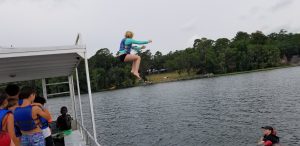
Cooling off time at 4-H Camp Cherry Lake
So being away from home, making new friends, being a part of a team, and trying new things are key building blocks to obtaining a successful experience to meet the developmental needs of youth. 4-H summer camp provides youth the platform to create great memories and lasting relationships that can last a lifetime.
For more information on how your youth can participate in 4-H camps, find your local UF IFAS Extension Office and contact your 4-H Agent to explore what programs are offered in your area.
by Allison Leo | Jul 26, 2019
Mindfulness is the act of creating awareness of your surroundings, emotions, and physical self in the present moment. It helps you connect to the world around you, while providing cognitive, social, and emotional benefits. Practicing mindfulness is not just for adults. Children can reap a multitude of benefits from learning and practicing mindfulness. Mindfulness equips children with the ability to adjust and deal with conflict encountered in their daily lives. It can also help children foster an optimistic outlook in life, react to stress in a healthy way, and develop a positive self-concept.
The practice of mindfulness is foreign to many adults, making it tricky to teach young children. The best thing to do is keep the message simple and model the behaviors you are teaching. Being taught by an adult that models mindful behaviors daily will assist kids in mastering the techniques. Below are a few mindfulness activities you can do at home as a family or in a group learning environment, such as a 4-H club meeting.
Zen Garden
A zen garden is a miniature landscape made with items such as moss,
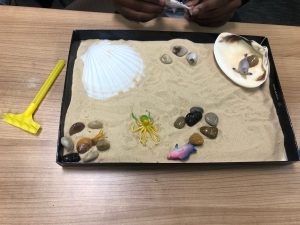
Zen garden created during Leon County 4-H Mindfulness Camp
rocks, and water features. Zen gardens are filled with sand and contain a small rake that you can use to create designs in the sand. The motion of raking the sand creates a sense of calmness. Zen gardens are often found on desks in the workplace because they are known for building focus and reducing stress. Building a zen garden is a fun and easy activity you can do with kids. Use a shoebox lid as the base and collect various stones and other items from outside to fill the box. Small rakes and sand can be purchased at a local craft store.
Mindful Safari
Taking a nature walk around your neighborhood or park is a simple way to exercise your mindfulness skills. Make it exciting by telling them you are going on a “mindfulness safari” and the goal is to see how many different birds, insects, and animals you can find on your journey. By searching for these items, you are fostering an awareness of the world around you. Similar to the mindful safari activity, you can take children on a “sound hunt.” This activity teaches kids to increase their awareness of the sounds in their environment. You can make the “sound hunt” more challenging by asking them to distinguish which sounds are close and which sounds are far.
Breathing
Breathing exercises are an important tool children can use to practice mindfulness. Learning how to control your breath and increase awareness of your breathing can help clear your mind in times of distress. You can practice breathing anywhere and no equipment is needed. Have kids sit on the floor or lie down. Instruct them to close their eye and take a huge breath in, filling up their lungs. Count to three and have them release. Breath activities can be completed sitting or lying down on your back. It is a good practice to have kids place their hands on their belly to feel the breath as it enters and leaves the body.
Mindful Eating
Mindful eating teaches children to understand when they are hungry and when they are full. It is important to eat without distractions, such as the television or your phone. Provide them with a variety of snack items. Ask them to look, listen, touch, smell, and taste the food in steps. They should pause after each step to reflect on what their senses are showing them about their food. First, look at what colors and shapes the item has. Next, listen to see if your food is making any sounds. Then, feel your food and describe the texture. Smell the item and define the scent. Finally, taste the food while paying attention to how the food feels and if the flavors change.
Yoga & Balancing
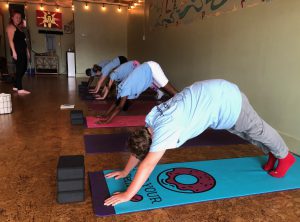
Practicing our “downward dog” pose during Leon County 4-H Mindfulness Camp.
Yoga is a great way to practice concentration, balance, and connection. Kids enjoy trying different yoga poses and stretches. A variety of free educational videos are available online that you can use to help guide you and your child through yoga sequences. Breathing techniques can be coupled with yoga and balancing. If kids do not have a yoga mat, a towel can be used. Practicing yoga shows kids that mindfulness does not always mean you are still or quiet.
Mindful Drawing
It is important to keep distractions to a minimum while drawing. This can be achieved by putting on relaxing music or simple sounds, such as rain falling or waves crashing. There are a variety of different drawing activities you can do with kids to practice mindfulness. If you have different sounds available, you can select a sound and instruct them to close their eyes and think of what that sound looks like to them. Then, have them open their eyes and draw what they heard. You can repeat this activity a few times with different sounds.
Body Appreciation
This activity works best in a group learning environment. Have kids break up into pairs and instruct them to take turns tracing each other on a large sheet of paper. Once everyone is finished, they will focus on their own bodies and write or draw what each body part does for them. For example, they can write “my head helps me think” or “my legs help me run.” Finally, they will write positive words on their body such as “I love to read.” This activity makes kids reflect on all the important ways their body helps them each day. It teaches them to appreciate and love their body.
Gratitude Journal
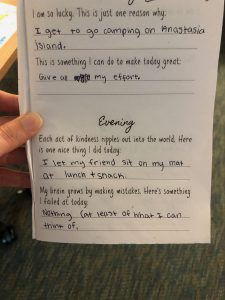
Gratitude Journals are a simple mindfulness activity kids can complete every day
When we feel and express gratitude to people in our lives, it creates loving connections, builds trust, and makes us feel joyful. Gratitude can be shown by giving someone a hug or telling them how much you appreciate them. Gratitude journals can easily be made at home or you can print off a pre-made template. This version is simple and is a great start for kids: https://researchparent.com/gratitude-journal-for-kids/
For more information on how your family can learn more healthy activities such as these mindful ones, find your local UF IFAS Extension Office and contact your 4-H Agent to explore what 4-H programs are offered in your area.



























